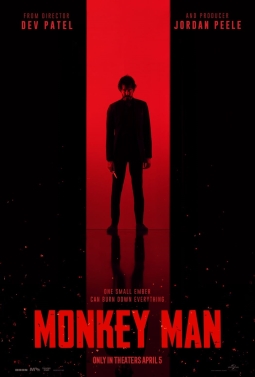At a time where headlines about how the Hollywood studio system is failing creatives pop up just about every week, it's a pleasant surprise when a story about them doing the opposite comes out. Dev Patel's Monkey Man is one of those rare times where a studio came to the aid of a project that had become a casualty of this cruel, unjust industry. Monkey Man was picked up by Netflix after it wrapped production in March 2021 and for a number of reasons including reported fears over backlash from the Indian government over the film's political commentary, it sat idly in the streaming giant's increasingly large library of completed works awaiting release.
Earlier this year, a guardian angel arrived in the form of Jordan Peele. He had the opportunity to see the film and was so impressed it with that he convinced Universal-with whom his production company Monkeypaw has a first look deal with-to acquire it from Netflix and give it a global theatrical release. Just over 3 years after production ended, Monkey Man made its way to cinema screens in the United States and after all of the agony and misfortune that Patel endured while trying to get the film out into the world, he should be beaming with pride that his great directorial debut ended up getting the release it deserved.
Monkey Man is Patel's way of announcing to the world that he's an action star AND a filmmaker. In telling this tale of a young man whose been figuratively and literally beaten down by the injustices of the Indian caste system who slowly transforms from being motivated by inflicting violent revenge on the powerful people that killed his mother to a fighter for all of the underdogs that have been exploited or tormented by the ruling class, he establishes himself as a strong creative voice that is uncompromising in bringing their vision to life and willing to stray from what's expected from the genre. He displays a ton of restraint by making a revenge actioner that goes long stretches without any bodies dropping as it follows the protagonist's evolution and the unforeseen setbacks in his plan that made it possible. The action sequences that are heavily influenced by the bone-crunching brutality of genre films from South Korea and Indonesia make the most out of the film's limited budget by crafting scenes that favor ingenuity over scale, which leads to a whole lot of brutal close quarters fighting with improvised weapons that perfectly embody the film's scrappy underdog spirit. The camera moves with precision through temples, open-air markets and dingy nightclubs run by really evil people and every cut has real gravity and purpose behind it. Patel isn't quite there as a storyteller yet as the social commentary elements of Monkey Man's script are a bit muddled and underdeveloped, but his feel and passion for the craft of action filmmaking is among the strongest we've seen in a directorial debut since John Wick nearly a decade ago.
Clearly, I have no way of knowing what Patel wants to do next in his career. Monkey Man's long journey to the screen kept him away from acting in anything else for a while, so maybe he just wants to focus on being in front of the camera and cashing in on some less stressful paychecks for the time being. But if/when he elects to direct again, I'll be extremely excited to see what he does. It takes a whole lot of talent to make such an assured, endearing first film and may Patel be able to find the support he didn't initially get on Monkey Man from the jump on his next outing.
Grade: B+

No comments:
Post a Comment